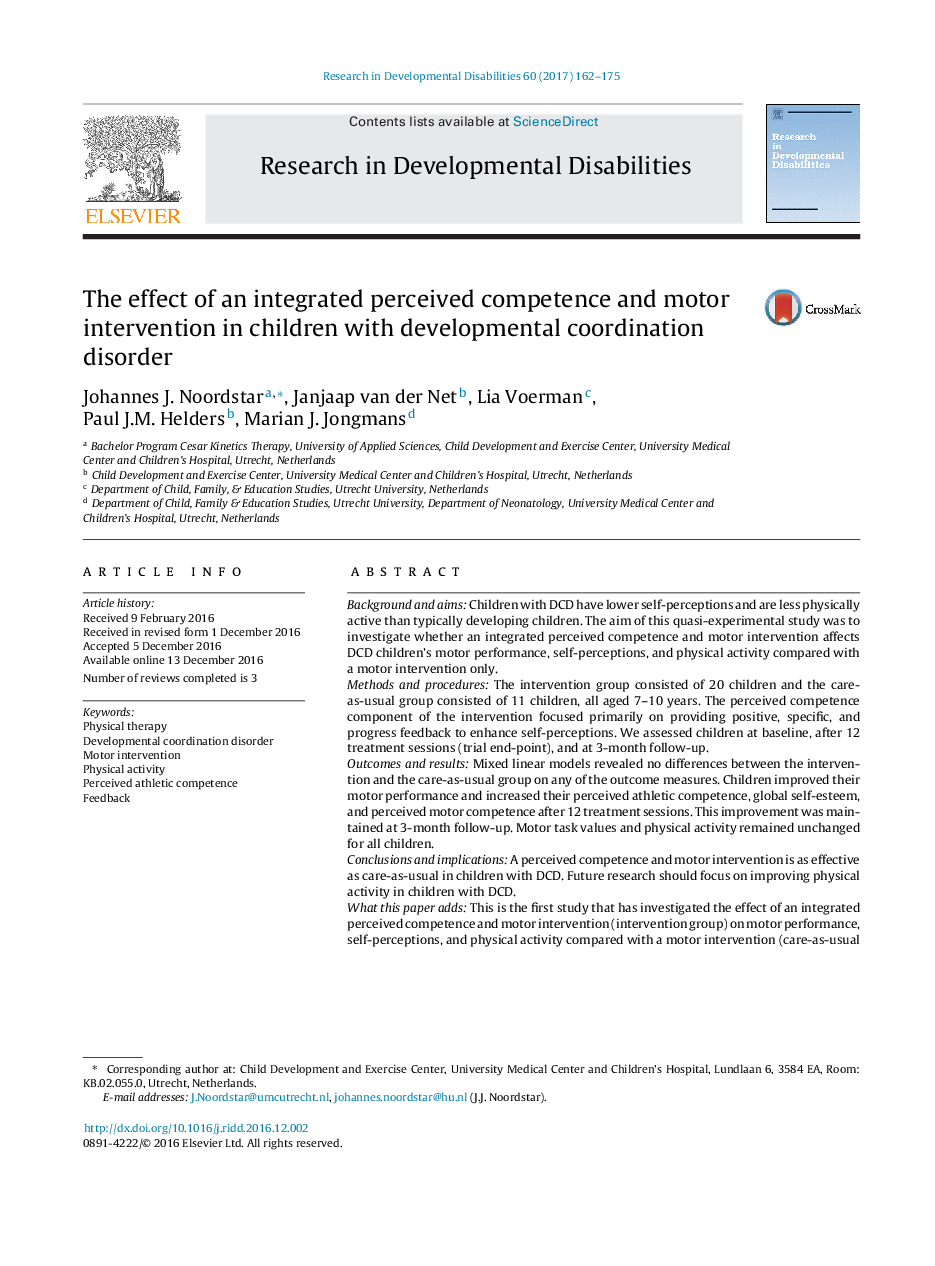| کد مقاله | کد نشریه | سال انتشار | مقاله انگلیسی | نسخه تمام متن |
|---|---|---|---|---|
| 4941025 | 1436631 | 2017 | 14 صفحه PDF | دانلود رایگان |
In children with DCD:
- An integrated perceived competence and motor intervention is just as effective as a motor intervention only.
- Perceived athletic competence increases after a motor intervention.
- Physical activity and task values remain the same after a motor intervention.
- Most improvement was still present after 3 months of no intervention.
Background and aimsChildren with DCD have lower self-perceptions and are less physically active than typically developing children. The aim of this quasi-experimental study was to investigate whether an integrated perceived competence and motor intervention affects DCD children's motor performance, self-perceptions, and physical activity compared with a motor intervention only.Methods and proceduresThe intervention group consisted of 20 children and the care-as-usual group consisted of 11 children, all aged 7-10 years. The perceived competence component of the intervention focused primarily on providing positive, specific, and progress feedback to enhance self-perceptions. We assessed children at baseline, after 12 treatment sessions (trial end-point), and at 3-month follow-up.Outcomes and resultsMixed linear models revealed no differences between the intervention and the care-as-usual group on any of the outcome measures. Children improved their motor performance and increased their perceived athletic competence, global self-esteem, and perceived motor competence after 12 treatment sessions. This improvement was maintained at 3-month follow-up. Motor task values and physical activity remained unchanged for all children.Conclusions and implicationsA perceived competence and motor intervention is as effective as care-as-usual in children with DCD. Future research should focus on improving physical activity in children with DCD.What this paper addsThis is the first study that has investigated the effect of an integrated perceived competence and motor intervention (intervention group) on motor performance, self-perceptions, and physical activity compared with a motor intervention (care-as-usual group) in children with DCD. We made the perceived competence component explicit by providing positive, specific, and progress feedback to enhance children's self-perceptions. Also, this is one of the first studies that has investigated the effect after both 12 treatment sessions (trial end-point) and after 3 months of no intervention (3-month follow-up). We found no differences between the intervention and the care-as-usual group, but children improved their motor performance and increased (most) of their self-perceptions after 12 treatment sessions, while physical activity remained the same. The improvement was still present at the 3-month follow-up. We also benchmarked our results about self-perceptions and physical activity to a group of typically developing children. Self-perceptions in children with DCD had improved to the level of typically developing children after 12 treatment sessions, but their physical activity levels remained significantly lower. This result was the same at the 3-month follow-up, except for perceived athletic competence, which was lower in children with DCD at the 3-month follow-up. In accordance with previous intervention studies that have investigated children with DCD, we found large intra-group variability in the change in motor performance and self-perceptions in children with DCD. We argue that we need to better understand why some children with DCD improve and others do not after a motor intervention.
Journal: Research in Developmental Disabilities - Volume 60, January 2017, Pages 162-175
